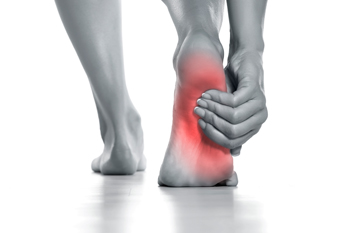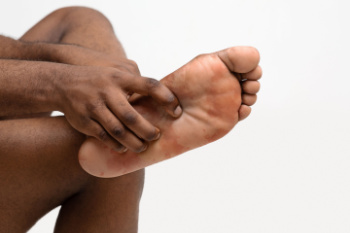October 2024
What Causes Foot Pain?

Foot pain can stem from a variety of causes, affecting daily activities and overall quality of life. Diseases such as arthritis and diabetes can lead to inflammation and nerve damage, resulting in chronic discomfort. Deformities like bunions or hammertoes change the structure of the foot, often causing pain during movement. Biomechanical conditions, including flat feet or high arches, can disrupt weight distribution and lead to strain on the muscles and ligaments. Additionally, wearing improper footwear is a significant contributor to foot pain, and shoes that lack support or fit poorly can worsen existing issues. Injuries from sports, falls, or accidents can also cause acute pain, impacting mobility. Any type of foot pain can cause difficulty in completing daily activities. If you have developed foot pain, it is suggested that you contact a podiatrist who can provide an accurate diagnosis and treatment.
Foot Pain
Foot pain can be extremely painful and debilitating. If you have a foot pain, consult with one of our doctors from Coral Desert Foot & Ankle. Our doctors will assess your condition and provide you with quality foot and ankle treatment.
Causes
Foot pain is a very broad condition that could be caused by one or more ailments. The most common include:
- Bunions
- Hammertoes
- Plantar Fasciitis
- Bone Spurs
- Corns
- Tarsal Tunnel Syndrome
- Ingrown Toenails
- Arthritis (such as Gout, Rheumatoid, and Osteoarthritis)
- Flat Feet
- Injury (from stress fractures, broken toe, foot, ankle, Achilles tendon ruptures, and sprains)
- And more
Diagnosis
To figure out the cause of foot pain, podiatrists utilize several different methods. This can range from simple visual inspections and sensation tests to X-rays and MRI scans. Prior medical history, family medical history, and any recent physical traumatic events will all be taken into consideration for a proper diagnosis.
Treatment
Treatment depends upon the cause of the foot pain. Whether it is resting, staying off the foot, or having surgery; podiatrists have a number of treatment options available for foot pain.
If you have any questions, please feel free to contact one of our offices located in St. George and Kanab, UT, and Mesquite, NV . We offer the newest diagnostic and treatment technologies for all your foot care needs.
Preventing Injuries Before and After Your Run

Incorporating stretches into your running routine is vital for injury prevention and overall performance. Before running, dynamic stretches such as leg swings and high knees help warm up the muscles and improve flexibility, preparing your body for the activity ahead. Additionally, lunges with a twist can enhance hip mobility and balance. After running, static stretches like hamstring stretches and calf stretches are essential for cooling down and reducing muscle stiffness. Holding each stretch for about 30 seconds helps release tension and aids in recovery. Regularly performing these stretches before and after your runs can reduce the risk of injuries, improve flexibility, and support overall running efficiency. If you have sustained a foot injury from running, it is suggested that you visit a podiatrist who can offer you relief and treatment options, and guide you on the importance of stretching before and after running.
All runners should take extra precaution when trying to avoid injury. If you have any concerns about your feet, contact one of our doctors of Coral Desert Foot & Ankle. Our doctors will treat your foot and ankle needs.
How to Prevent Running Injuries
There are a lot of mistakes a runner can make prior to a workout that can induce injury. A lot of athletes tend to overstretch before running, instead of saving those workouts for a post-run routine. Deep lunges and hand-to-toe hamstring pulls should be performed after a workout instead of during a warmup. Another common mistake is jumping into an intense routine before your body is physically prepared for it. You should try to ease your way into long-distance running instead of forcing yourself to rush into it.
More Tips for Preventing Injury
- Incorporate Strength Training into Workouts - This will help improve the body’s overall athleticism
- Improve and Maintain Your Flexibility – Stretching everyday will help improve overall performance
- “Warm Up” Before Running and “Cool Down” Afterward – A warm up of 5-10 minutes helps get rid of lactic acid in the muscles and prevents delayed muscle soreness
- Cross-Training is Crucial
- Wear Proper Running Shoes
- Have a Formal Gait Analysis – Poor biomechanics can easily cause injury
If you have any questions, please feel free to contact one of our offices located in St. George and Kanab, UT, and Mesquite, NV . We offer the newest diagnostic and treatment technologies for all your foot care needs.
Heel Pain May Indicate Plantar Fasciitis

Plantar fasciitis is a common condition that results in pain and inflammation in the heel and bottom of the foot. The primary symptom is a sharp, stabbing pain, particularly noticeable with the first steps in the morning or after prolonged periods of sitting. The discomfort often eases with movement but may return after long periods of standing or walking. This condition is typically caused by excessive strain on the plantar fascia, the thick band of tissue running along the bottom of the foot. Contributing factors include overuse, footwear that lacks ample cushioning, and having poor foot biomechanics, such as flat feet or high arches. Activities that involve repetitive stress, like running or standing for long periods, can also increase the risk. If you have heel pain, it is suggested that you visit a podiatrist who can offer an accurate diagnosis and treatment.
Plantar fasciitis is a common foot condition that is often caused by a strain injury. If you are experiencing heel pain or symptoms of plantar fasciitis, contact one of our doctors from Coral Desert Foot & Ankle. Our doctors can provide the care you need to keep you pain-free and on your feet.
What Is Plantar Fasciitis?
Plantar fasciitis is one of the most common causes of heel pain. The plantar fascia is a ligament that connects your heel to the front of your foot. When this ligament becomes inflamed, plantar fasciitis is the result. If you have plantar fasciitis you will have a stabbing pain that usually occurs with your first steps in the morning. As the day progresses and you walk around more, this pain will start to disappear, but it will return after long periods of standing or sitting.
What Causes Plantar Fasciitis?
- Excessive running
- Having high arches in your feet
- Other foot issues such as flat feet
- Pregnancy (due to the sudden weight gain)
- Being on your feet very often
There are some risk factors that may make you more likely to develop plantar fasciitis compared to others. The condition most commonly affects adults between the ages of 40 and 60. It also tends to affect people who are obese because the extra pounds result in extra stress being placed on the plantar fascia.
Prevention
- Take good care of your feet – Wear shoes that have good arch support and heel cushioning.
- Maintain a healthy weight
- If you are a runner, alternate running with other sports that won’t cause heel pain
There are a variety of treatment options available for plantar fasciitis along with the pain that accompanies it. Additionally, physical therapy is a very important component in the treatment process. It is important that you meet with your podiatrist to determine which treatment option is best for you.
If you have any questions, please feel free to contact one of our offices located in St. George and Kanab, UT, and Mesquite, NV . We offer the newest diagnostic and treatment technologies for all your foot care needs.
Causes of Heel Pain

Heel pain is a common issue, often caused by various conditions, including plantar fasciitis, Achilles tendinitis, heel spurs, and bursitis. Plantar fasciitis, one of the most frequent causes, results in stabbing pain due to inflammation in the plantar fascia, a thick band of tissue connecting the heel to the toes. Pain is often felt first thing in the morning or after periods of inactivity. Achilles tendinitis occurs from overuse or strain on the Achilles tendon, causing pain at the back of the heel. Heel spurs are calcium deposits that develop over time and can lead to sharp pain with movement. Bursitis is inflammation of the bursa, small fluid-filled sacs that cushion bones, which can cause tenderness and discomfort in the heel. Treatment for heel pain depends on the cause but may include wearing supportive footwear or medical intervention like injections. If you have persistent heel pain, it is suggested that you schedule an appointment with a podiatrist for a proper diagnosis and treatment.
Many people suffer from bouts of heel pain. For more information, contact one of our doctors of Coral Desert Foot & Ankle. Our doctors can provide the care you need to keep you pain-free and on your feet.
Causes of Heel Pain
Heel pain is often associated with plantar fasciitis. The plantar fascia is a band of tissues that extends along the bottom of the foot. A rip or tear in this ligament can cause inflammation of the tissue.
Achilles tendonitis is another cause of heel pain. Inflammation of the Achilles tendon will cause pain from fractures and muscle tearing. Lack of flexibility is also another symptom.
Heel spurs are another cause of pain. When the tissues of the plantar fascia undergo a great deal of stress, it can lead to ligament separation from the heel bone, causing heel spurs.
Why Might Heel Pain Occur?
- Wearing ill-fitting shoes
- Wearing non-supportive shoes
- Weight change
- Excessive running
Treatments
Heel pain should be treated as soon as possible for immediate results. Keeping your feet in a stress-free environment will help. If you suffer from Achilles tendonitis or plantar fasciitis, applying ice will reduce the swelling. Stretching before an exercise like running will help the muscles. Using all these tips will help make heel pain a condition of the past.
If you have any questions please contact one of our offices located in St. George and Kanab, UT, and Mesquite, NV . We offer the newest diagnostic and treatment technologies for all your foot and ankle needs.
It's Time for Beautiful Feet
Symptoms of Diabetic Peripheral Neuropathy

Peripheral neuropathy caused by diabetes affects the nerves in the feet and can lead to a variety of uncomfortable or extremely painful sensations. People with diabetic peripheral neuropathy may experience numbness, tingling, or a burning feeling in their feet. In some cases, they may notice sharp, shooting pains that occur suddenly. These symptoms can make walking difficult and increase the risk of balance issues or falls. Nerve damage can also make it hard to detect injuries, leading to foot sores or blisters that go unnoticed. Without proper sensation, even minor injuries can become serious if left untreated, leading to infection or gangrene. A podiatrist plays an important role in managing peripheral neuropathy by diagnosing the condition, offering treatment options to alleviate pain, and helping prevent further complications. If you have foot pain caused by neuropathy, it is suggested that you schedule an appointment with a podiatrist for a diagnosis and treatment.
Neuropathy
Neuropathy can be a potentially serious condition, especially if it is left undiagnosed. If you have any concerns that you may be experiencing nerve loss in your feet, consult with one of our doctors from Coral Desert Foot & Ankle. Our doctors will assess your condition and provide you with quality foot and ankle treatment for neuropathy.
What Is Neuropathy?
Neuropathy is a condition that leads to damage to the nerves in the body. Peripheral neuropathy, or neuropathy that affects your peripheral nervous system, usually occurs in the feet. Neuropathy can be triggered by a number of different causes. Such causes include diabetes, infections, cancers, disorders, and toxic substances.
Symptoms of Neuropathy Include:
- Numbness
- Sensation loss
- Prickling and tingling sensations
- Throbbing, freezing, burning pains
- Muscle weakness
Those with diabetes are at serious risk due to being unable to feel an ulcer on their feet. Diabetics usually also suffer from poor blood circulation. This can lead to the wound not healing, infections occurring, and the limb may have to be amputated.
Treatment
To treat neuropathy in the foot, podiatrists will first diagnose the cause of the neuropathy. Figuring out the underlying cause of the neuropathy will allow the podiatrist to prescribe the best treatment, whether it be caused by diabetes, toxic substance exposure, infection, etc. If the nerve has not died, then it’s possible that sensation may be able to return to the foot.
Pain medication may be issued for pain. Electrical nerve stimulation can be used to stimulate nerves. If the neuropathy is caused from pressure on the nerves, then surgery may be necessary.
If you have any questions, please feel free to contact one of our offices located in St. George and Kanab, UT, and Mesquite, NV . We offer the newest diagnostic and treatment technologies for all your foot care needs.





